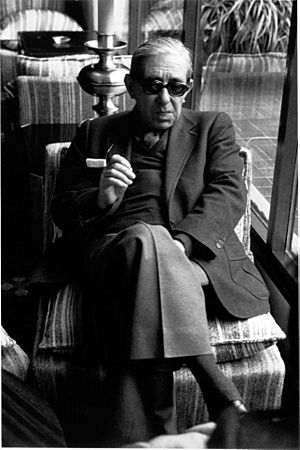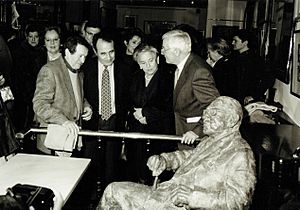Gonzalo Torrente Ballester facts for kids
Quick facts for kids
Gonzalo Torrente Ballester
|
|
|---|---|

Photograph by Elisa Cabot (1982)
|
|
| Born | 13 June 1910 Ferrol (A Coruña), Spain |
| Died | 27 January 1999 (aged 88) Salamanca, Spain |
| Occupation | Writer, novelist |
| Nationality | Spanish |
| Notable works | Javier Mariño Don Juan |
| Seat E of the Real Academia Española | |
| In office 27 May 1977 – 27 January 1999 |
|
| Preceded by | Juan Ignacio Luca de Tena |
| Succeeded by | Carmen Iglesias |
Gonzalo Torrente Ballester (born June 13, 1910 – died January 27, 1999) was an important Spanish writer. He is known for his novels and was part of a group of writers called the Generation of '36.
Contents
Life of Gonzalo Torrente Ballester
Gonzalo Torrente Ballester was born in Serantes, a town near Ferrol, in Galicia, Spain. He started his education there. Later, he studied at the University of Santiago de Compostela and the University of Oviedo.
Early Career and Challenges
Even though he is best known for his novels, Gonzalo also wrote for newspapers. He wrote essays and plays too. His writing career began in Oviedo, but he did most of his work in Madrid.
Before the Spanish Civil War started, he went to Paris. He planned to write his advanced university paper there. However, a big political event happened in Spain in July 1936. After thinking it over, he went back to Spain in October to be with his family. He decided to join a political group called the Falange. His first novel, Javier Mariño, came out in 1943. He kept writing novels almost until he died. Many of his books won major awards.

Later Life and Recognition
After 1939, Gonzalo started to distance himself from the Falange political group. He returned to Santiago for a university job. In 1962, he joined protests to support miners who were on strike. Because of this, he lost his teaching job at the university. In the mid-1960s, he had some problems with government officials who checked what writers published.
In 1966, he moved to the United States. He took a job at the University at Albany, State University of New York. He was the first special professor there and stayed until 1973. In 1975, he moved to the city of Salamanca, Spain. He lived there until he passed away. After returning to Spain, he became more and more famous. He was chosen to be a member of the Real Academia Española, which is a very important Spanish language academy. He took his seat on May 27, 1977. In 1985, he won the Cervantes Prize. This is the most important literary award in Spain.
Right after he died, a special foundation was created. It is called the Fundación Gonzalo Torrente Ballester. Its goal is to protect, study, and share his amazing work.
Novels by Gonzalo Torrente Ballester
Here is a list of some of the novels Gonzalo Torrente Ballester wrote:
- Javier Mariño (1943)
- El golpe de estado de Guadalupe Limón (1946)
- Ifigenia (1950)
- Los Gozos y Las Sombras: El Señor llega (1957)
- Donde da la vuelta el aire (1960)
- La Pascua triste (1962) - This series won the Novel prize of the Fundación Juan March.
- Don Juan (1963)
- Off-Side (1968)
- La Saga/Fuga de J.B. (1972) - This book won the Critics' Prize and City of Barcelona Prize.
- Fragmentos de Apocalipsis (1977)
- La isla de los jacintos cortados (1980) - This book won the National Literature Prize.
- Dafne y ensueños (1982)
- Quizá nos lleve el viento al infinito (1984)
- La princesa durmiente va a la escuela (1985)
- La rosa de los vientos (1985)
- Yo no soy yo, evidentemente (1987)
- Filomeno, a mi pesar (1988) - This book won the Planet Prize.
- Crónica del rey pasmado (1989)
- Las islas extraordinarias (1991)
- La muerte del decano (1992)
- La novela de Pepe Ansúrez (1994)
- La boda de Chon Recalde (1995)
- Los años indecisos (1997)
- Doménica (1999)
Screenplays by Gonzalo Torrente Ballester
Gonzalo Torrente Ballester also wrote stories for movies. These are called screenplays:
- Night Arrival (1949)
- Surcos (1951)
- Devil's Roundup (1952)
- Rebellion (1954)
See also
 In Spanish: Gonzalo Torrente Ballester para niños University of Santiago de Compostela
In Spanish: Gonzalo Torrente Ballester para niños University of Santiago de Compostela

